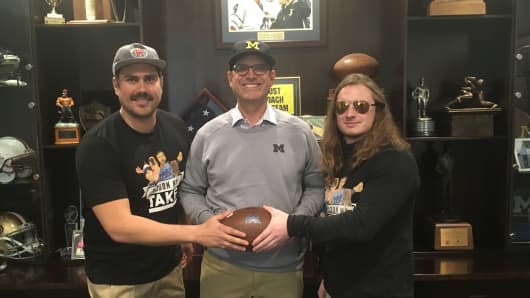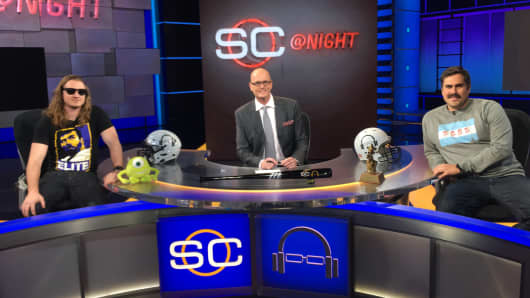When you think of the next version of the nightly news, you think of Vice.
But what do you think about when you think of a totally new sports brand that fits this mobile and social generation?
I’m arguing the answer is Barstool Sports.
Barstool Sports is one of the most talked about new sports-related companies to appear in the last decade. Since early last year, it’s been 51 percent owned by The Chernin Group, which kept the core personalities of the original Boston-based Barstool and pushed it out nationally. Besides podcasts, it also has a website and video clips it distributes socially, and it’s experimented with a linear TV show.
Barstool Sports also has one of the most popular sports podcasts: “Pardon My Take,” hosted by Big Cat and PFT Commenter.
If its traffic is actually ahead of the Bill Simmons Podcast, as the Apple Podcast rankings have shown for the last year, that would mean “Pardon My Take” regularly brings in more than 500,000 listeners per episode. It’s a remarkable achievement for a year-old podcast and a testament to the power of Barstool’s brand of humor, irreverent takes and sports for 18- to 30-year-old men.
But don’t take it from me: I asked a poll question a few days ago about what “new” sports start-up would be the biggest brand in 2021. Here was my list:
- Simmons’ The Ringer
- Barstool Sports
- Bleacher Report
- Subscription site The Athletic
Are there other hot new sports brands that should have been on the list? SB Nation? Deadspin?
The fact it’s tough to name four says something about the start-ups. It also says something about the strength of the sports incumbents. ESPN may be nearly 40-years-old, but these start-ups have a long way to go to equal its power.
I immediately heard complaints about my list of four emerging sports brands. In particular, some would say Barstool is really more a lifestyle brand for young men, I was told. It’s about post-college life, girls, humor, with a dash of sports thrown in.
But the results speak for themselves.
Tweet here
The voting was close for a while but then Barstool pulled away with it.
Star power
There’s one big risk facing Barstool Sports in achieving that goal of being the biggest sports brand on that list by 2021: what if Big Cat and PFT Commenter leave to start their own media podcast start-up?
The model here for them to do that is Crooked Media with ex-Obama staffers Jon Favreau, Tommy Vietor, Jon Lovett and Dan Pfeiffer. They started a popular political podcast as part of Simmons’ Ringer podcast network last year in the runup to the election. It rocketed to popularity.
Then they left the Ringer, created an LLC, launched without raising any VC money, and almost immediately had five popular podcasts instead of one on the podcast charts. They own 100 percent of their economics now. They’re reading ads for Blue Apron and Casper, they’re going on tours of auditoriums around the country doing their podcasts in front of an audience and keeping all the money.
Why wouldn’t Big Cat and PFT Commenter do the same if they were popular enough?
Of course, Barstool could give them more cash and stock to stay. Or someone like ESPN could also come in and make a “Godfather” offer to bring some of that start-up spirit to their mothership.
One thing is clear: It’s a lot harder to build a brand-new sports brand today than most people think. It’s hard for small brands like The Ringer or Barstool Sports to keep their best talent. If you’re a big enough star today, you can easily hang out your shingle, with your own podcast and attract advertisers if you have a big enough audience. And you can bank more of that money directly instead of sharing it with the bosses.
It’s ironic that the same forces which make it easier for popular individuals like Big Cat and PFT Commenter to go off on their own today also make it increasingly difficult for any start-up to become “the next ESPN.” Sometimes being a big rich dinosaur with 40 years of habit-forming momentum behind you has its advantages.
Commentary by Eric Jackson, sign up for Eric’s monthly Tech & Media Email. You can follow Eric on Twitter
@ericjackson
.






